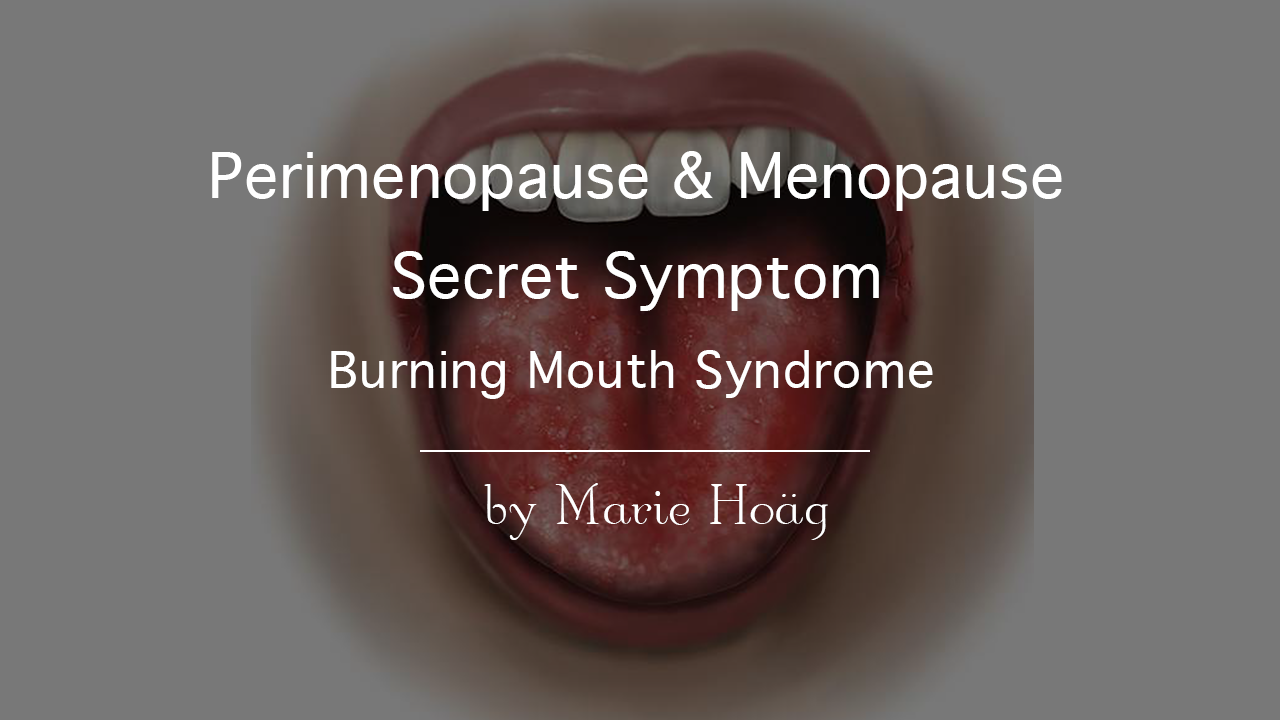Perimenopause and Menopause Secret Symptom: Burning Mouth Syndrome

If you’re in perimenopause or menopause and have ever felt a strange burning, stinging, or tingling in your mouth—with no obvious cause—you may have experienced Burning Mouth Syndrome (BMS).
You’re not alone. Studies show that about 40% of women in menopause suffer with BMS. Yet most are told it’s not related to their hormones, leaving them frustrated and in pain. Not even dentists make the hormone connection.
Why So Many Women Are Left Without Answers
Most medical studies have dismissed a hormonal connection to BMS. The reasoning? When women in studies were given hormone therapy, their symptoms didn’t improve. The conclusion was that estrogen deficiency couldn’t possibly be the cause.
But here’s what those studies don’t tell you:
- The HRT used was too low-dose to make an impact.
- Women weren’t on it long enough to allow real healing.
- Symptoms like BMS often improve later in the hormone-balancing process—not right away.
So, women are left believing BMS has nothing to do with their hormones, when in reality, estrogen plays a critical role in oral health.
What I’ve Seen in Real Women
As a clinical hormone coach working alongside HRT physicians for over 20 years, I’ve had the privilege of guiding women through the hormone balancing process—helping them fully restore their empty estrogen and progesterone tanks with therapeutic-dosed HRT systems.
I have also had burning tongue syndrome for about 5 years, which went away after filling up my empty estrogen tank. I didn’t realize just how much estrogen influenced nearly every part of my body. It took about 4 months, but I have never experienced it since. This was just one more thing I couldn’t believe was related to low estrogen levels.
Here’s what I’ve noticed again and again:
- There are three phases of the hormone restoration process. In phase one, women often feel relief from anxiety, depression, brain fog, headaches, and insomnia.
- As the phases progress, they notice missing joint pain, more energy, better coping skills, and a sense of inner peace and happiness.
- Typically, in phase two of the hormone restoration process, many suddenly realize something surprising—that strange burning in their mouth or tongue is gone, not to mention a bundle of other things no one relates to estrogen deficiency.
It’s not uncommon for women to say, “I never thought to mention this before, but I used to have BMS. Now it’s completely gone.” Not only that, you can replace “BMS” in the previous sentence with a hundred other things.
Why Estrogen Matters for Your Mouth
Estrogen regulates fluid balance and tissue hydration in the body, including your mouth. When estrogen is low, tissues in the mouth, gums, and tongue become dry and fragile. This creates a perfect storm for:
- Burning tongue
- Altered taste
- Increased dental caries
- Dry mouth
- Gum irritation
- Oral microbiome imbalance
- Periodontal disease
When estrogen is restored to healthy levels, the body retains moisture, repairs tissues, and rebuilds resilience—even in the oral cavity. In fact, everything in your body rehydrates when estrogen is fully restored.
When everything in your body is rehydrated, then your body and the processes of your body work better from your brain to your big toe.
What This Means for You
If you’re dealing with burning mouth, don’t brush it off as “just aging.” It could be your body telling you it needs hormones. Even if you’re already on HRT, you may not be getting enough, or on the right HRT protocol.
The truth is, women deserve better than being put on low dosed HRT and told their pain isn’t real or that hormones can’t help. BMS is a condition that can change your quality of life—and your confidence.
You can control how your brain and body perform by paying attention to your hormone levels and giving yourself what you need to fully function and thrive.
What You Can Do
If you’re experiencing burning mouth syndrome, burning tongue, or a lump in your throat, don’t dismiss the possibility that it may be estrogen deficiency related. Even if you are currently on HRT, it may be that your dosage or regimen is not sufficient to fully restore your estrogen levels.
At Panacea Sciences Advanced Hormone Balancing telehealth clinic, we use advanced hormone balancing systems designed to help women restore estrogen to their Hormone Sweet Spot™—the precise balance where symptoms like BMS, anxiety, joint pain, and insomnia are rare.
If you’d like to understand whether your symptoms may be linked to hormone deficiency, schedule a complimentary discovery session. You’ll leave with clarity on whether advanced hormone balancing could be a fit for you.
![]()
Reference:
Bergdahl M, Bergdahl J. Burning mouth syndrome: prevalence and associated factors. J Oral Pathol Med. 1999 Sep;28(8):350-4.
Ciesielska, A., Kusiak, A., Ossowska, A., & Grzybowska, M. E. (2021). Changes in the oral cavity in menopausal women—A narrative review. International Journal of Environmental Research and Public Health, 19(1), 253.
Dahiya, P., Kamal, R., Kumar, M., Niti, Gupta, R., & Chaudhary, K. (2013). Burning mouth syndrome and menopause. International Journal of Preventive Medicine, 4(1), 15–20.
Meurman, J. H., Tarkkila, L., & Tiitinen, A. (2009). The menopause and oral health. Maturitas, 63(1), 56–62.
Nagamine, T. (2022). Two-hit theory by estrogen in burning mouth syndrome. Journal of Dental Sciences, 17(4), 1833–1834.
Seol, S.-H., & Chung, G. (2022). Estrogen-dependent regulation of transient receptor potential vanilloid 1 (Trpv1) and P2X purinoceptor 3 (P2x3): Implication in burning mouth syndrome. Journal of Dental Sciences, 17(1), 8–13.
Vaidya, R. (2012). Burning mouth syndrome at menopause: Elusive etiology. Journal of Midlife Health, 3(1), 3–4.

Join my mailing list to receive the latest news and updates on blog posts, new podcast episodes, in-person and online events, appearances, webinars, and programs.





